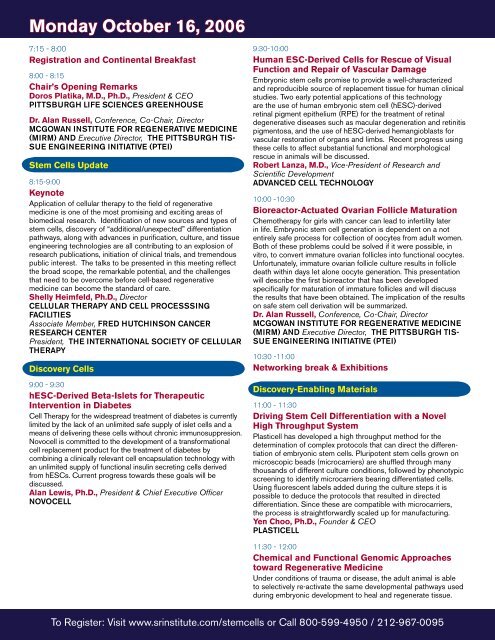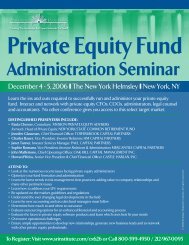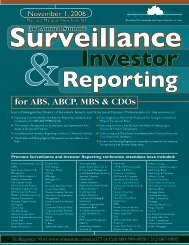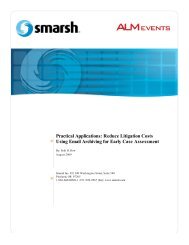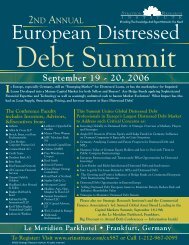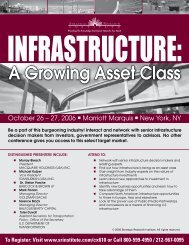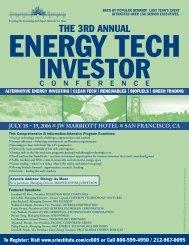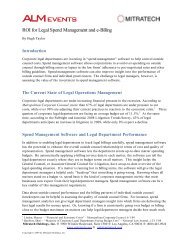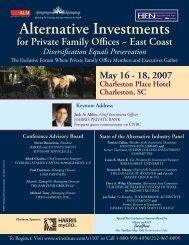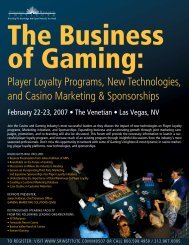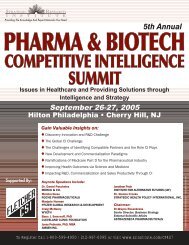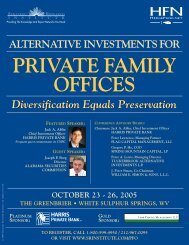RegeneRative mediCine - ALM Events
RegeneRative mediCine - ALM Events
RegeneRative mediCine - ALM Events
You also want an ePaper? Increase the reach of your titles
YUMPU automatically turns print PDFs into web optimized ePapers that Google loves.
Monday October 16, 2006<br />
7:15 - 8:00<br />
Registration and Continental breakfast<br />
8:00 - 8:15<br />
Chair’s opening remarks<br />
Doros Platika, M.D., Ph.D., President & CEO<br />
PITTSBURGH LIFE SCIENCES GREENHOUSE<br />
Dr. Alan Russell, Conference, Co-Chair, Director<br />
McGowan Institute for Regenerative Medicine<br />
(MIRM) and Executive Director, The Pittsburgh Tissue<br />
Engineering Initiative (PTEI)<br />
Stem Cells update<br />
8:15-9:00<br />
Keynote<br />
Application of cellular therapy to the field of regenerative<br />
medicine is one of the most promising and exciting areas of<br />
biomedical research. Identification of new sources and types of<br />
stem cells, discovery of “additional/unexpected” differentiation<br />
pathways, along with advances in purification, culture, and tissue<br />
engineering technologies are all contributing to an explosion of<br />
research publications, initiation of clinical trials, and tremendous<br />
public interest. The talks to be presented in this meeting reflect<br />
the broad scope, the remarkable potential, and the challenges<br />
that need to be overcome before cell-based regenerative<br />
medicine can become the standard of care.<br />
Shelly Heimfeld, Ph.D., Director<br />
Cellular Therapy and Cell Processsing<br />
Facilities<br />
Associate Member, Fred Hutchinson Cancer<br />
Research Center<br />
President, the International Society of Cellular<br />
Therapy<br />
Discovery Cells<br />
9:00 - 9:30<br />
hESC-derived beta-islets for therapeutic<br />
intervention in diabetes<br />
Cell Therapy for the widespread treatment of diabetes is currently<br />
limited by the lack of an unlimited safe supply of islet cells and a<br />
means of delivering these cells without chronic immunosuppresion.<br />
Novocell is committed to the development of a transformational<br />
cell replacement product for the treatment of diabetes by<br />
combining a clinically relevant cell encapsulation technology with<br />
an unlimited supply of functional insulin secreting cells derived<br />
from hESCs. Current progress towards these goals will be<br />
discussed.<br />
Alan Lewis, Ph.D., President & Chief Executive Officer<br />
Novocell<br />
9:30-10:00<br />
Human ESC-derived cells for rescue of visual<br />
function and repair of vascular damage<br />
Embryonic stem cells promise to provide a well-characterized<br />
and reproducible source of replacement tissue for human clinical<br />
studies. Two early potential applications of this technology<br />
are the use of human embryonic stem cell (hESC)-derived<br />
retinal pigment epithelium (RPE) for the treatment of retinal<br />
degenerative diseases such as macular degeneration and retinitis<br />
pigmentosa, and the use of hESC-derived hemangioblasts for<br />
vascular restoration of organs and limbs. Recent progress using<br />
these cells to affect substantial functional and morphological<br />
rescue in animals will be discussed.<br />
Robert Lanza, M.D., Vice-President of Research and<br />
Scientific Development<br />
Advanced Cell Technology<br />
10:00 -10:30<br />
Bioreactor-actuated ovarian follicle maturation<br />
Chemotherapy for girls with cancer can lead to infertility later<br />
in life. Embryonic stem cell generation is dependent on a not<br />
entirely safe process for collection of oocytes from adult women.<br />
Both of these problems could be solved if it were possible, in<br />
vitro, to convert immature ovarian follicles into functional oocytes.<br />
Unfortunately, immature ovarian follicle culture results in follicle<br />
death within days let alone oocyte generation. This presentation<br />
will describe the first bioreactor that has been developed<br />
specifically for maturation of immature follicles and will discuss<br />
the results that have been obtained. The implication of the results<br />
on safe stem cell derivation will be summarized.<br />
Dr. Alan Russell, Conference, Co-Chair, Director<br />
McGowan Institute for Regenerative Medicine<br />
(MIRM) and Executive Director, The Pittsburgh Tissue<br />
Engineering Initiative (PTEI)<br />
10:30 -11:00<br />
Networking break & Exhibitions<br />
Discovery-Enabling materials<br />
11:00 - 11:30<br />
Driving Stem Cell Differentiation with a Novel<br />
High Throughput System<br />
Plasticell has developed a high throughput method for the<br />
determination of complex protocols that can direct the differentiation<br />
of embryonic stem cells. Pluripotent stem cells grown on<br />
microscopic beads (microcarriers) are shuffled through many<br />
thousands of different culture conditions, followed by phenotypic<br />
screening to identify microcarriers bearing differentiated cells.<br />
Using fluorescent labels added during the culture steps it is<br />
possible to deduce the protocols that resulted in directed<br />
differentiation. Since these are compatible with microcarriers,<br />
the process is straightforwardly scaled up for manufacturing.<br />
Yen Choo, Ph.D., Founder & CEO<br />
Plasticell<br />
11:30 - 12:00<br />
Chemical and Functional Genomic Approaches<br />
toward Regenerative Medicine<br />
Under conditions of trauma or disease, the adult animal is able<br />
to selectively re-activate the same developmental pathways used<br />
during embryonic development to heal and regenerate tissue.<br />
To Register: Visit www.srinstitute.com/stemcells or Call 800-599-4950 / 212-967-0095


